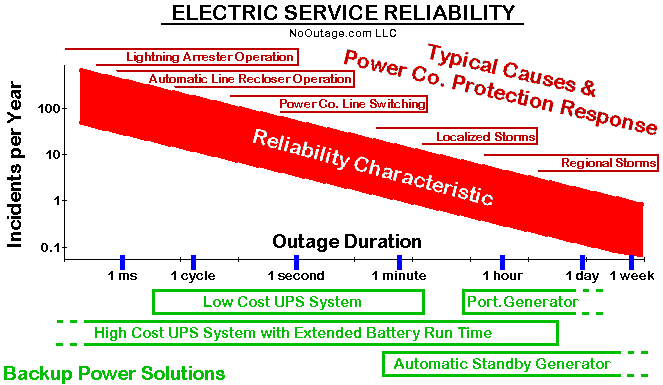The reliability of power company electricity service varies greatly due to many factors including the design of the power grid, protective features, capacity and location of power generation facilities, the location of your service on that grid, power system investment and maintenance practices, severe weather frequency, etc. Urban areas generally experience better reliability than remote rural locations. The graph below shows a hypothetical reliability characteristic for a power system. As shown in the graph below, the chances of experiencing prolonged multi-day power outages in a given year are less than the odds of momentary losses of power.

The most common means of providing backup power during outages is shown by the green bars
at the bottom of the graph. The lengths of the bars indicate the time periods that
these technologies can operate. For example, most low cost uninterruptible power
supply (UPS) systems transfer to the internal battery/inverter in 4-8 milliseconds when a
loss of normal power is detected. This is fast enough so that most electronic loads
are unaffected. But the internal batteries in these UPS systems are sized to last
only 5-15 minutes in order to provide enough time for an orderly shutdown of the equipment
they feed. If backup power is required for a longer period than the UPS can provide,
it is usually supplemented with an automatic standby generator. Note that the two
bars overlap around the 1 minute time frame. When a properly designed system
integrates these two types of solutions, backup power is available to cover a period
starting milliseconds after the outage begins and extending out to several days until
normal utility power is restored.
On a practical level, why would a residential or small commercial electricity customer need or want to spend the resources to purchase and install a backup power source? Here are some practical reasons and considerations that may apply when utility power is lost to utility customers:
Prevent spoilage of perishables in refrigerator or freezers.
Protect property from weather damage, such as freezing
of pipes or flooding due to inoperable sump pumps.Avoid having to move out of residence, with the inconvenience
and the associated extra costs of food and lodging, etc.Reduce chance of vandalism by continuing to occupy residence.
Maintain a safe and comfortable environment at home for a
family member in poor health.Allow use of safer electric space heating as compared to use
of a fireplace, or portable kerosene or propane heaters. These
have caused carbon monoxide poisoning, fires and deaths.Allow continued operation of home based business.
Many of these considerations have economic impacts and can apply to commercial establishments as well. Some types of businesses in fact could expect more sales during a power outage if they are able to continue operating.
An often overlooked fact is that even the nation’s electric utilities themselves plan and design for power outages. That is why many power plants have nearby combustion turbines or diesel generators with "black start" capability. These enable the generating stations to restart in the event of a major widespread blackout. And in the case of nuclear plants, the law requires not just one emergency backup generator but two fully redundant units designed to withstand earthquakes and protected from severe weather effects. Just such diesel generators were critical for maintaining a Florida nuclear plant in a safe condition for 6 1/2 days after Hurricane Andrew struck in 1992. This was detailed in a report, "The Effect of Hurricane Andrew on the Turkey Point Nuclear Generating Station from August 20-30, 1992," jointly sponsored by Institute of Nuclear Power Operations and the U.S. Nuclear Regulatory Commission, March 1993.
But the most compelling reason for purchasing a backup power source is
personal experience. Anyone who has endured a prolonged power outage and coped with the
inconvenience and costs is highly motivated to do something to avoid a repeat experience.
For a sample of some of some of these experiences, see personal stories.